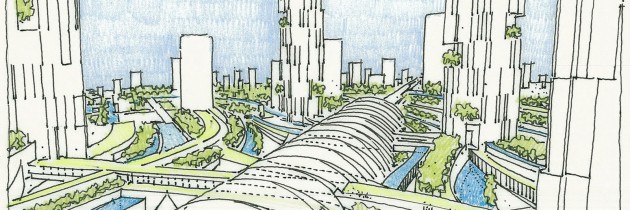Modi Vows to Curb Prices While Promising India 100 Smart Cities
India’s top opposition leader Narendra Modi promised voters cheaper goods and 100 “smart cities” in unveiling steps to boost Asia’s third-biggest economy as he seeks to unseat the ruling Congress party. Modi’s Bharatiya Janata Party will create a stabilization fund to combat Asia’s fastest inflation and form special courts to try those who hoard goods, he said in New Delhi yesterday. A Modi-led government would also improve the rail network and power supply in the world’s second-most populous nation, he told thousands of party workers.“The country has never witnessed such a debacle before,” Modi, the chief minister of western Gujarat state, said at the end of a three-day party meeting to devise a strategy to win elections due by May. “The 2014 elections are not just for a change of government, but a fresh ray of hope for Indians.”
Modi is seeking to harness voter anger over higher prices of everything from onions to medicine to win power in a nation where more than 800 million people live on less than $2 per day. The focus on economic issues also helps draw the spotlight away from criticism from opponents who accuse him of complicity in 2002 anti-Muslim riots in Gujarat, which killed more than 1,000 people and left Modi barred from entering the U.S.
“Modi is a natural communicator, and his ability to take the conversation forward is helping people forget about his past,” said N. Bhaskara Rao, chairman of the New Delhi-based Centre for Media Studies. “He’s now batting with a huge lead and his electoral feet are firmly set.”
No Majority
Opinion polls show Modi’s BJP leading Prime Minister Manmohan Singh’s Congress party, with neither winning a majority. The emergence of the anti-graft Aam Aadmi Party, which is planning to contest the national vote after taking power in Delhi state last month, has added further uncertainty to the election outcome.
Singh’s 10-year-old government has struggled to control spending after implementing programs to boost rural wages and provide cheap food, putting India at risk of a credit-rating downgrade to so-called junk status. Modi said he planned to establish a real-time database of agriculture goods and prices to bring down costs.
“Ninety percent of the time, these methods of predicting inflation don’t work because you’re tailing and can’t draw ahead of the curve,” said Rajiv Kumar, an economist and former secretary-general of the Federation of Indian Chambers of Commerce and Industry. “The devil is really in the details.”
‘Brand India’
In a convention-style speech to cheering party leaders, Modi pledged to improve education and health facilities, create more jobs, and attract more tourists as part of building “Brand India.” He called for more satellite cities to drive economic growth.
“Urbanization should not be seen as a challenge, but as an opportunity,” Modi said.
Since 2001, when Modi took office, Gujarat’s economy has grown 10.1 percent a year on average over the 11-year period ended March 2012, compared with 7.6 percent nationwide, according to the Planning Commission and data compiled by Bloomberg. Companies such as Ford Motor Co. (F) and Reliance Industries Ltd. announced investments in the state in that time.
“It’ll be very, very difficult for Modi to replicate the Gujarat model unless the BJP gets an absolute majority in the elections,” said Satish Misra, a political analyst at the Observer Research Foundation, a New Delhi-based policy group.
‘Sacrifice’
In his speech, Modi also took swipes at Rahul Gandhi, the Congress party’s vice president whose family has dominated Indian politics for more than six decades. His mother Sonia Gandhi, the party’s president, overruled other senior leaders last week who wanted Rahul named as the party’s formal prime minister candidate to counter Modi.
“When defeat is imminent, which mother will sacrifice her son,” Modi said, referring to Sonia and Rahul.
Congress leaders have sought to discredit Modi, with Singh saying earlier this month that Modi “would be disastrous for the country” and presided over a “mass massacre.” A party resolution last week said communal forces threaten “to rupture the very basic fabric of our nation’s unity and social cohesion.”
The riots followed the killing of Hindu activists in a train fire, a blaze for which Muslims were later found guilty. While human rights groups accuse Modi of failing to control subsequent violence, he denies wrongdoing and a Supreme Court-appointed panel found no evidence that he made decisions that prevented victims from receiving help.
Dynasty
Modi didn’t mention the riots and avoided statements that would appeal to BJP stalwarts who favor a more predominate role for Hinduism in India. Hindus make up about 80 percent of the population, with Muslims accounting for 13 percent, according to the CIA World Factbook.
Modi instead attacked India’s dynastic politics without referring to the Gandhis by name. Rahul Gandhi’s great-grandfather, grandmother and father all served as prime ministers.
“They think it is below their dignity to fight against a person who was born in a backward class, one whose mother used to clean dishes in the neighborhood, a person who used to sell tea in railway compartments,” Modi said, referring to himself. “Those having prominent surnames feel it insulting to fight against those who are known for their work.”
Fonte: bloomberg.com



